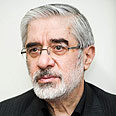
Mousavi lashes out at Ahmadinejad over Iran sanctions
Iranian opposition leader says UN sanctions 'will affect nation's security, economy', urges government to explain to people impact of decision
Iranian opposition leader Mir Hossein Mousavi lashed out at President Mahmoud Ahmadinejad on Wednesday for dismissing UN sanctions and urged the government to brief people about the impact of the measures.
"To say that this resolution is like a 'used hankie' will not ease the hardships arising from demagogic policies, as it is clear to me that this resolution will affect our nation's security and economy," Mousavi said in a direct attack on Ahmadinejad.
He was referring to a UN Security Council resolution adopted on June 9 that imposed new sanctions on Iran over the country's refusal to halt enrichment of uranium as part of its nuclear program. Ahmadinejad dismissed them, saying they were like a "used hankie and must be thrown in the dust bin."
"This oppressive resolution ... will decrease GDP, increase unemployment, create more hardships for people and widen the gap between us and other developing nations, especially our neighbors," the opposition leader said on his Kaleme.com website.
'People should know the truth'
Mousavi urged the government to tell the people about the impact of the sanctions.
"They should know the effect of this resolution ... on their livelihood, inflation, the nation's progress and security. If people are asked to resist (sanctions), then their trust should be earned by telling them the truth."
Mousavi also took the opportunity to criticize the elite Revolutionary Guards, saying the force should focus on work it was formed for and not "in economic affairs" of the country.
"Bringing Sepah (Guards) back to its main responsibilities can decrease the greed of enemies ... and decrease the wave of corruption," he said.
The Guards, under the presidency of Ahmadinejad, has expanded its role in the economy. The force was set up after the 1979 Islamic revolution to defend the revolution from internal and external threats.
Meanwhile, atomic chief Ali Akbar Salehi acknowledged on Wednesday for the first time that the sanctions "may slow down" Tehran's nuclear program and could pose difficulties for its main uranium enrichment work.
"One can't say sanctions are ineffective," ISNA news agency quoted Salehi as saying.
"If sanctions are aimed at preventing Iran's nuclear activities ... we say they may slow down the work, but will not stop the activities. This is a certainty."
- Follow Ynetnews on Facebook










